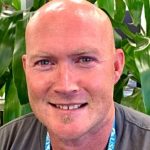
Bryan Peck
‘A Neurobiological Evaluation of Surf Therapy for Australian Combat Veterans with Post-Traumatic Stress Disorder.’
University of Sunshine Coast, QLD
Awarded 2018
Co-funded by Rotary District 9675 (9750)
“I wanted to understand more about PTSD; how someone can experience a trauma they didn’t choose, resulting in a debilitating negative sense of a flawed self which could prevent optimal functioning in health and daily life.”
Researcher Profile
Bryan became interested in mental health through his studies in psychology. Bryan has conducted courses and workshops in mental health and illness for the past 7 years. More recently Bryan founded, and is the director of a small business on the Sunshine Coast providing psychoeducation to the community in an effort to raise people’s mental health literacy leading to better intra and inter-personal responses to mental health challenges.
In 2018, Bryan implemented multi-week stand up paddle board programs for people with mental health conditions – increasing physical activity, social engagement, skills and self-efficacy, and engagement with nature.
Project Summary
Post-Traumatic Stress Disorder (PTSD) is a stress-based health condition that typically occurs after someone experiences a traumatic event. People with PTSD experience significant changes in cognitive functioning, emotion regulation, overwhelming memories and dreams, and increased fight or flight response. PTSD is also associated with higher rates of cardiovascular disease, diabetes, obesity, poor diets, and sedentary behaviour. For many Australian combat veterans, PTSD is a significant source of disability leading to challenges adjusting to their post-service lives. With current treatments for PTSD (e.g., medication, talk therapy) presenting significant limitations for veterans worldwide, neurobiological and clinical evidence for adjunctive interventions (e.g., physical exercise) that support greater components of health and well-being need to be better understood.
This project aims to utilise specialised neuroimaging modalities to quantitatively examine changes in neurobiological and psychological functioning of combat veterans with a diagnosis of PTSD following an 8-week Surf Therapy intervention.
Comparisons will be made between veterans following a Surf Therapy PTSD intervention; a standard exercise intervention; and healthy individuals.
This research project will employ a multimodal neuroimaging protocol, combining:
- Structural and functional MRI
- Diffusion Tensor Imaging (DTI)
- Magnetic Resonance Spectroscopy (MRS)
- Electroencephalography (EEG)
This project will examine the interaction between neurobiological, psychological, and physical measures of health and well-being following an adventure-based physical exercise intervention that is highly accessible, and enjoyed by millions around the world.
Supervisors: Professor Jim Lagopoulos, Professor Dan Hermens & Associate Professor Philip Ward